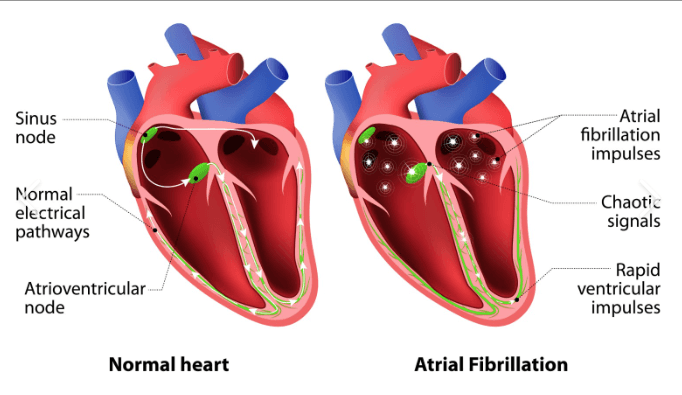
What is Atrial fibrillation and why do we need to talk about it?
Atrial fibrillation, or AFib, is a heart rhythm disorder where the upper parts of the heart — the atria — don’t beat in a regular pattern. Instead, they quiver or flutter rapidly, causing the heart to pump in an irregular and often fast rhythm.
Your heartbeat feels out of sync—erratic and faster than usual. Some have described AFib "like a restless engine struggling to find its rhythm." The sensation can be unsettling, making the heart seem like it's racing or fluttering uncontrollably.
Common Risk Factors for AFib:
Atrial fibrillation risk climbs with age, high blood pressure, and diabetes. Heart disease, obesity, and sleep apnea also raise the odds significantly. Alcohol, smoking, lung conditions, and an overactive thyroid can all play a role. Even stress, surgery, or certain medications may tip your heart out of rhythm.
WHAT ARE THE SYMPTOMS?
This irregular heartbeat can reduce how well the heart moves blood around the body and may lead to light- headedness, fainting, extreme fatigue, shortness of breath, sweating and chest pain, swelling in your legs, or a pounding heartbeat. It also increases the chance of forming blood clots, which can travel to the brain and cause a stroke.
You might notice that your mind feels foggy, making work and daily tasks harder to manage. Or maybe you haven’t felt any obvious symptoms at all, only to be caught off guard when your doctor says, “You have Atrial Fibrillation.” The diagnosis can come unexpectedly and is often picked up by chance during a routine check-up or heart test.
In fact, for some people, a stroke may be the first noticeable sign that they have atrial fibrillation — which is why it’s so important to detect and manage this condition early.
About a third of people with AFib will experience a stroke without proper treatment.
SO WHAT DO WE DO?
Don’t wait. Go see your doctor. AFib isn’t always an emergency, but it can lead to serious problems like stroke. The sooner you get checked, the better the chances of keeping it under control, maybe even reversing it. This isn’t something to ignore or "just live with.”
Treating AFib usually starts with tests to understand your heart rhythm and triggers. Some people may just need medications, while others might need procedures like cardioversion or ablation to restore normal rhythm. Blood thinners are often used to prevent stroke. If medications don’t work or cause bad side effects, catheter ablation or minor surgery might be next. In rare cases, pacemakers are needed. The right treatment depends on your symptoms, health, and how your AFib behaves—so work closely with your doctor.
Your first AFib episode can feel scary, bringing anxiety and emotional challenges. AFib impacts both your heart and your well-being, often causing mood changes and sleep difficulties. Taking steps to understand and manage AFib can improve your quality of life and reduce stress. Early treatment helps prevent AFib from worsening and protects your heart’s health. Reaching out to others with AFib offers support, hope, and valuable insight on the path to recovery.
Acting early really matters.
